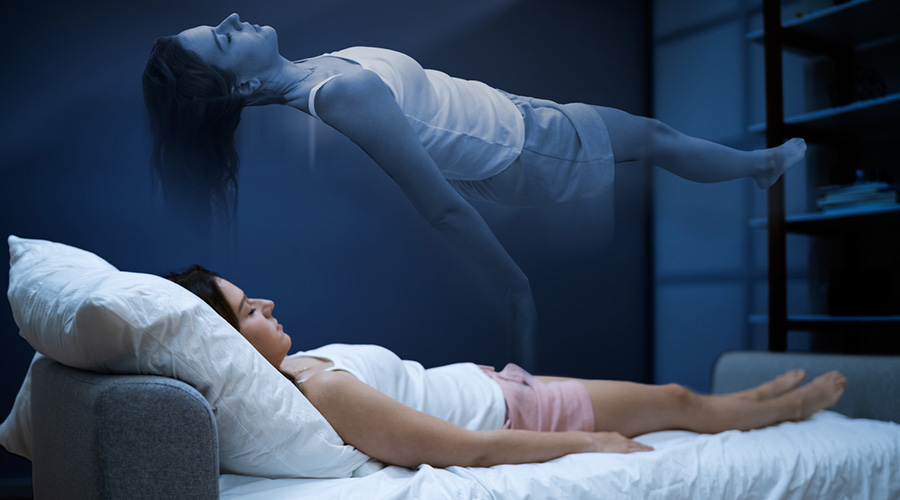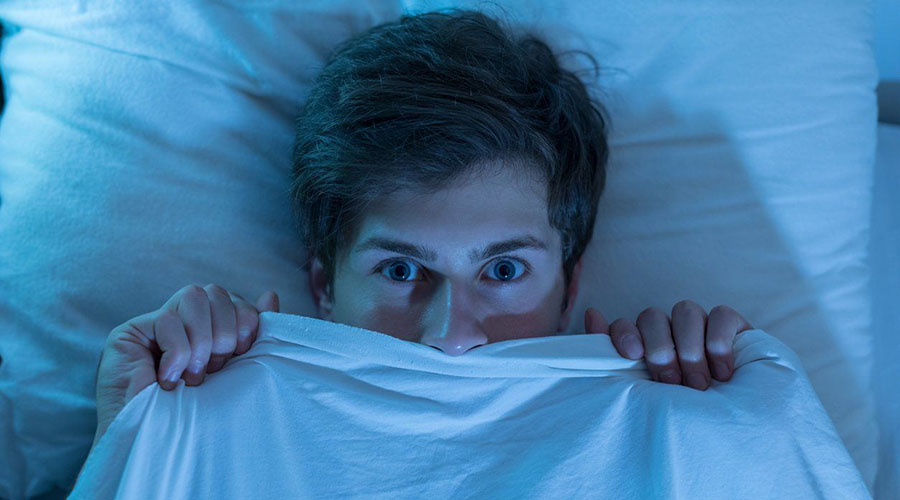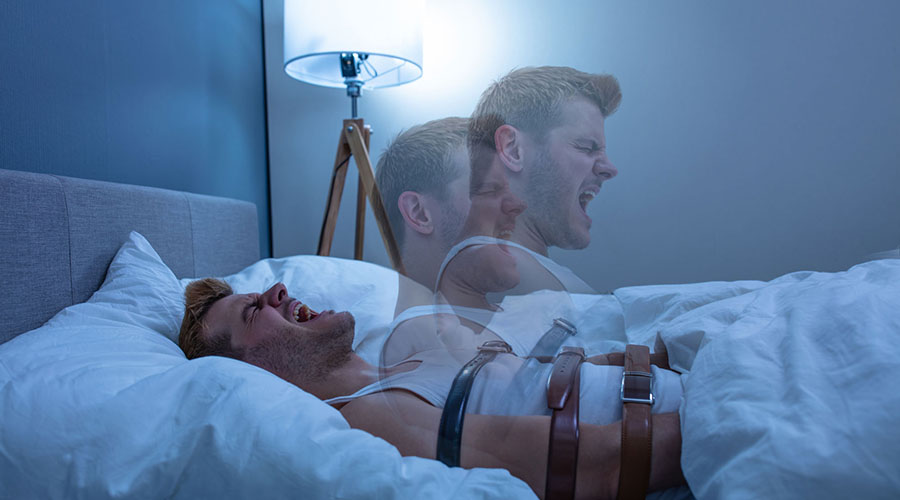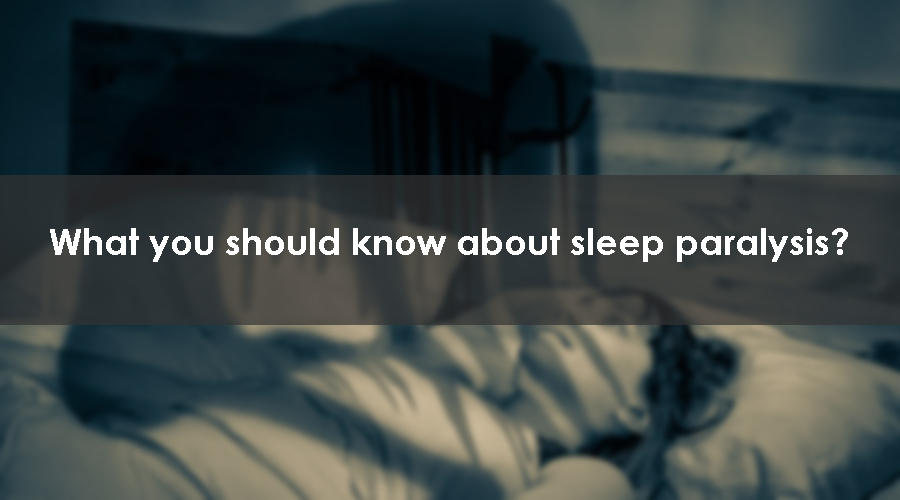Sleep paralysis is a condition in which people can experience an inability to move or speak during sleep. It can be a frightening experience, and some people believe that it is the precursor to demonic possession. There is no one cause of sleep paralysis, but it may be related to abnormalities in brain function. Treatment depends on the underlying cause, but often involves medications or therapy. In this blog post, we will get to know more about this strange sleeping condition and how to deal with it.
What is sleep paralysis?
Sleep paralysis is a phenomenon that occurs when a person passes through the stages of sleep, but their body paralyzes them so they cannot move. It can be accompanied by hallucinations or a sense of choking.
Sleep paralysis usually lasts a few seconds to minutes, but in rare cases, it can last for hours. There is no known cause for sleep paralysis, but it is thought to be related to stress, anxiety, and sleeping habits. There are many different methods for getting rid of sleep paralysis, but most of them involve a combination of therapy and medications for most other sleep disorders.

The main two methods are known as hypnosis and the Dormancy program. The Dormancy program usually involves training a person to relax during sleep. It is an alternative treatment that uses hypnosis and the use of guided imagery to relax the mind while sleeping.
Hypnosis is a form of self-hypnosis that involves helping a person to relax into a trance-like state. This allows them to enter into the subconscious mind where they can make changes and solve problems.
Read also about how often to inject sustanon 250
What are the types of sleep paralysis?
Sleep paralysis is a phenomenon that can occur when a person passes through the stages of sleep. As the person drifts off to sleep, they may feel their body become heavy and paralyzed. This may be accompanied by a feeling of being suffocated or crushed.
In some cases, people may also see or hear things that aren’t there. Sleep paralysis usually lasts for a few seconds to a minute, but in rare cases, it can last for hours. There are several types of recurrent sleep paralysis, including isolated sleep paralysis, recurrent isolated sleep paralysis, and narcolepsy-associated sleep paralysis.

A few unusual sleep paralysis cases have been reported in which the person may be able to physically move during their experience. These people are known as “dissociative” or “hypnopompic” sleep paralysis. Sleep paralysis is often accompanied by vivid hallucinations.
Some people report hearing strange sounds or seeing things that aren’t really there. The body and brain of the person experiencing sleep paralysis are temporarily immobilized. The person’s eyes and mouth may be closed, but they may be fully conscious. As a result, they cannot move or speak and are unable to open their eyes.
Who gets sleep paralysis?
Sleep paralysis is a condition that affects many people. It can be very frightening, as it can feel like you are unable to move or speak. The condition usually occurs when a person is falling asleep or waking up.

There is no known cure for sleep paralysis, but there are ways to reduce the risk of experiencing it. Sleep paralysis is a phenomenon that occurs when a person is awake but appears to be asleep. It can occur at any time, but most often happens just before or right after falling asleep or waking up. There are many things that can cause sleep paralysis.
Sleep paralysis is most commonly associated with the transition between wakefulness and sleep, or when falling asleep or waking up. It can also happen while a person is already asleep. Sleep paralysis is often accompanied by an out-of-body experience, which can be terrifying and lead to panic attacks. A person who experiences sleep paralysis may feel a sense of detachment from their surroundings.
What are the causes of sleep paralysis?
Sleep paralysis is when a person feels paralyzed right before or after they fall asleep. This feeling can last for a few seconds, to a few minutes. The cause of sleep paralysis episodes is still unknown, but there are several factors that may contribute to it.

These factors include sleep deprivation, stress, and using the wrong sleeping position. Some people may also be more prone to sleep paralysis than others. The most common symptom is a feeling of extreme fear or dread right before falling asleep and right after waking up.
This feeling can be very intense, sometimes to the point where it keeps the person awake. Sleep paralysis is often associated with a number of other phenomena. These include “a feeling of intense dread or terror, paralysis and extreme fear”.
What are the symptoms of sleep paralysis?
Sleep paralysis is a phenomenon in which a person, either falling asleep or awakening, temporarily experiences an inability to move. It is not a disease, but rather a symptom of another problem.
The majority of people who experience sleep paralysis have no other symptoms. For some people, however, sleep paralysis can be accompanied by hallucinations. These hallucinations can be extremely frightening and may include feelings of being trapped in one’s own body, seeing shadowy figures standing over or around the bed, or feeling like one is being suffocated.

Sleep paralysis usually lasts for only a few seconds or minutes, but can occasionally last longer. Sleep paralysis can be caused by a number of conditions or medications. Frequent sufferers may report that they have learned to live with their experience, though it is still often reported as a frightening experience.
Psychological studies have shown that sleep paralysis is associated with a fear of dying and a fear of the unknown. One study showed that men are more likely than women to have experience sleep paralysis.
More info about testosterone cypionate 250mg for sale
How is sleep paralysis diagnosed?
Sleep paralysis is a rare sleep disorder that is estimated to affect about 8% of the population. It occurs when a person passes through Rapid Eye Movement or REM sleep and into wakefulness, but their body remains paralyzed.
This can cause feelings of terror, because a person may be aware of their surroundings but unable to move. Sleep paralysis is usually diagnosed based on a person’s symptoms and medical history. There is no specific test for sleep paralysis, but doctors may order tests to rule out other conditions that can cause similar symptoms. A sleep diary and a walkthrough of family history may help in diagnosing.

The most common treatment for sleep paralysis is to use medications to return a person to sleep. In some cases, doctors may prescribe muscle relaxants, which can be used on a short-term basis or for a few weeks at a time. A very rare phenomenon, it is known as the “vampire syndrome” or “sea monster syndrome”.
It occurs when a person having a dream or sleep paralysis experiences a feeling that they are being attacked by an invisible force. The sensation may be accompanied by nausea and other unpleasant symptoms. Sleep paralysis is not a symptom of sleep apnea. Sleep apnea is a condition where there are pauses in breathing while sleeping.
How can I stop sleep paralysis?
Sleep paralysis is a phenomenon that can occur when a person is falling asleep, or when they are waking up. During sleep paralysis, the person experiences a temporary inability to move or speak. This can be alarming, but it is not dangerous.

There are some things that people can do to try to reduce their risk of experiencing sleep paralysis. Avoid caffeine and alcohol before bed. Avoid watching scary movies and movies with a lot of action during the night. Try to get enough sleep. Practice deep breathing while trying to fall asleep. If you experience sleep paralysis frequently, talk to your doctor about it.
The Sleep Paralysis Questionnaire (SPQ) was developed to help people understand the nature of sleep paralysis, how often they experience it, and what circumstances tend to provoke it.
How can I prevent future episodes of sleep paralysis?
Sleep paralysis is a condition that can cause feelings of fear and helplessness because the person is temporarily unable to move. Most people only experience sleep paralysis once or twice in their lives, but for some people, it can be a recurring problem. There are several things you can do to prevent sleep paralysis from happening again.
One thing you can do is make sure you get enough sleep. Sleep deprivation can increase your risk of experiencing sleep paralysis. You should also try to go to bed and wake up at the same time every day, and avoid taking naps during the day. Improving sleep hygiene is also one way to go.
Another thing you can do is practice good sleep hygiene habits. This includes avoiding caffeine and alcohol before bed, and not watching TV or using electronic devices in bed. You should also make sure your bedroom is dark and quiet, and use comfortable sheets and blankets. Finally, you can try to figure out what causes sleep paralysis.
If you know the cause of your sleep paralysis, you can avoid it by avoiding that thing. Sleep paralysis is most likely to occur in the first half of the night but can occur any time during sleep. It tends to be more common in children and young adults, but it can also happen at any age. Men are more likely than women to experience sleep paralysis.
Conclusion
In conclusion, sleep paralysis is a condition that can be caused by many different factors. While it is not always harmful, it can be frightening for those who experience it. There are some steps that can be taken to help reduce the chances of experiencing sleep paralysis, such as maintaining a regular sleep schedule and avoiding caffeine and alcohol before bed. If you experience sleep paralysis, do not panic; try to relax and focus on your breath. If the episode persists or becomes too bothersome, consult a doctor for sleep medicine.
FAQ
What is the main cause of sleep paralysis?
Sleep paralysis is a phenomenon that occurs when a person passes through the stages of sleep, but their body remains in a state of wakefulness. This leaves the person feeling paralyzed and often panicked.
While there are many possible causes for sleep paralysis, the main cause is still unknown. Some possible causes include lack of sleep, stress, anxiety, jet lag, and certain health conditions. Sleep paralysis can also be caused by narcolepsy, which is a sleep disorder that causes a person to fall asleep suddenly and without warning.
Sleep paralysis occurs when a person is unable to move during the transition between sleeping and waking. This can happen for many reasons, but the main cause is still unknown.
Is sleep paralysis harmful?
Sleep paralysis is a phenomenon that occurs when a person passes through the stages of sleep, but their body becomes paralyzed. This leaves them unable to move, speak, or scream. Some people report feeling a sense of terror and being unable to breathe.
Sleep paralysis is not harmful in and of itself, but it can be a sign of an underlying condition like narcolepsy. It is also possible for people to experience hallucinations during sleep paralysis. Sleep paralysis is a common phenomenon that affects millions of people.
The exact cause of sleep paralysis is still unknown, but it has been linked to several underlying conditions. These include narcolepsy, which is a disorder that causes excessive daytime sleepiness.
How can I stop sleep paralysis?
Sleep paralysis is a condition in which a person is temporarily unable to move or speak because of muscle weakness during sleep. It can be caused by different things such as stress, anxiety, jet lag, and narcolepsy.
There are ways to help prevent sleep paralysis from happening such as creating a bedtime routine, avoiding caffeine and alcohol before bed, and practicing relaxation techniques before bed. If sleep paralysis does occur, there are ways to get out of it such as moving your fingers and toes, wiggling your nose, and taking deep breaths.
Sleepwalking is when a person falls asleep and then walks around while still asleep. It can happen to anyone at any time and whether or not you have trouble falling asleep, it is common for someone to sleepwalk.
How do doctors treat sleep paralysis?
Sleep paralysis is a condition in which a person experiences temporary paralysis upon waking up. This can be accompanied by a sense of being unable to breathe and is often considered a precursor to a full-blown panic attack.
While the experience of sleep paralysis can be frightening, it is usually not dangerous and can be treated with some simple steps. Sleep paralysis can be caused by many different things, such as a sleeping disorder or post-traumatic stress disorder. It is most commonly seen in people who have experienced an episode of sudden sleep deprivation.
Can a normal person get sleep paralysis?
Sleep paralysis is a phenomenon that can affect anyone. It occurs when a person passes through the stages of sleep, but their brain does not send the normal signals to the body to move. This can leave people paralyzed and feeling like they are unable to breathe.
While it is more common in people who suffer from anxiety or depression, it can also happen to people who have no history of mental health issues. There are several ways to treat sleep paralysis, and most people find that they eventually go away on their own.
Sleep paralysis is a phenomenon that can affect anyone. It occurs when a person passes through the stages of sleep, but their brain does not send the normal signals to the body to move.
